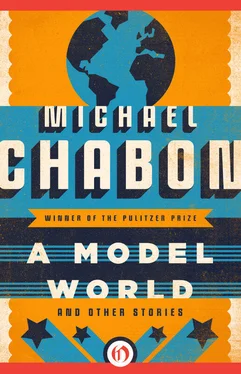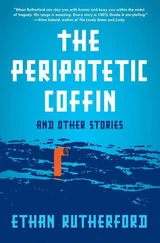Michael Chabon - A Model World And Other Stories
Здесь есть возможность читать онлайн «Michael Chabon - A Model World And Other Stories» — ознакомительный отрывок электронной книги совершенно бесплатно, а после прочтения отрывка купить полную версию. В некоторых случаях можно слушать аудио, скачать через торрент в формате fb2 и присутствует краткое содержание. Год выпуска: 2011, Издательство: Open Road Media, Жанр: Современная проза, на английском языке. Описание произведения, (предисловие) а так же отзывы посетителей доступны на портале библиотеки ЛибКат.
- Название:A Model World And Other Stories
- Автор:
- Издательство:Open Road Media
- Жанр:
- Год:2011
- ISBN:нет данных
- Рейтинг книги:5 / 5. Голосов: 1
-
Избранное:Добавить в избранное
- Отзывы:
-
Ваша оценка:
- 100
- 1
- 2
- 3
- 4
- 5
A Model World And Other Stories: краткое содержание, описание и аннотация
Предлагаем к чтению аннотацию, описание, краткое содержание или предисловие (зависит от того, что написал сам автор книги «A Model World And Other Stories»). Если вы не нашли необходимую информацию о книге — напишите в комментариях, мы постараемся отыскать её.
A Model World And Other Stories — читать онлайн ознакомительный отрывок
Ниже представлен текст книги, разбитый по страницам. Система сохранения места последней прочитанной страницы, позволяет с удобством читать онлайн бесплатно книгу «A Model World And Other Stories», без необходимости каждый раз заново искать на чём Вы остановились. Поставьте закладку, и сможете в любой момент перейти на страницу, на которой закончили чтение.
Интервал:
Закладка:
“What a shame it is,” he said, wiping at his own eyes. Magee was a sucker for weeping women, and lachrymose when he had been drinking.
“He had a great April,” said Beryl. Her Pittsburgh accent was flat and angular. She had fifteen years on Magee, and it was starting to tell. Her hair, blond as an ashwood bat, was entirely the product of technology now, and her face was looking papery and translucent and pinched at the corners. But she still had nice legs, with the pomaceous calves of a Pittsburgh girl. She had been raised on the steep staircases of Mt. Washington.
“He did,” said Magee. “Three-thirty-one with seven home runs and eighteen ribbies.”
“Hey, how about you?” She looked him up and down as though he had just gotten out of the hospital. “How’s the arm?”
He shrugged; the arm was fine. Magee had a problem with his mechanics. He had become balky and as wild as a loose fire hose. Although on the hill he felt the same as he had since the age of fourteen, jangling and irritable and clearheaded, some invisible element of his delivery had changed. The coaches felt that it was the fault of his right foot, which seemed to have grown half a shoe size in recent years. Whatever the cause, he could no longer find what Eli Drinkwater had called the wormhole. Drinkwater had picked up this term from Dr. Carl Sagan’s television program. A pitched ball passing through the wormhole disappeared for an instant and then reappeared somewhere else entirely, at once right on target and nowhere near where it ought to be, halfway across the galaxy, right on the edge of the black. Magee’s repeated, multiseasonal failure to find the wormhole had bred fear, and fear caution; he had undergone some horrendous shellings.
“It’s fine,” said Magee, rubbing at his left shoulder. “I’m going up to Buffalo this afternoon. Right after this.” He nodded in the general direction of the altar, before which sat the closed casket that held the body of Eli Drinkwater. It was a fancy black casket, whose size and finish and trim recalled those of the massive American automobiles its occupant had preferred.
The pastor finished his bit, and Gamble Wicklow, the Pittsburgh manager, rose to his feet and approached the pulpit. He was an eloquent speaker with a degree in law from Fordham — his sending down of Magee had been a masterpiece of regret and paternal solicitude — but he looked tired and elderly today. Magee could not make out what he was saying. Gamble had been sitting beside Roxille Drinkwater, in the foremost pew, and now there was a gap between Roxille and little Coleman. The sight of this gap was poignant, and Magee looked away.
“Will you look at that,” said Beryl. She went up on tiptoe to get a clearer view.
“I can’t,” said Magee.
“Look how Roxille’s looking at that casket.”
The reporters on either side of them, saddened, serious as the occasion required, were still rapacious and insatiable. They turned toward the grieving widow with the simultaneity of starlings taking wing. There was indeed something odd in the face and the posture of Roxille Drinkwater. Roxille was a pretty woman, a little heavy. Her russet hair was pulled tightly against her head and tied at the back. She wore no veil, and the look in her eyes was angry and complicated, but Magee thought he recognized it. Her husband had blown away, out of her life, like an empty wrapper, like a cloud of smoke. She was wondering how she could ever have thought he was real. As Magee watched she began to rock a little in the pew, back and forth. It was hardly noticeable at first, but as Wicklow’s voice rose to praise her dead husband for his constancy and steadiness, and to foretell the endurance of his presence in the game, Roxille’s rocking gathered force, and Magee knew he would have to do something.
Once, on an airplane, Magee had seen Roxille lose it. It had been during a night flight from New York, where Drinkwater had gone to collect an award, to Pittsburgh, aboard a careering, rattling, moaning little two-propeller plane. Roxille had begun by rocking in her seat, rocking and staring into the darkness outside the window of the plane. She had finished by shrieking and praying aloud, and then slapping a stewardess who attempted to calm her down. Now the people sitting in the pews around Roxille exchanged worried looks. Joey Puppo, the G.M., was frowning, and glancing frequently toward the reporters, who had begun to mutter and click their tongues. Magee saw that she intended, whether she knew it or not, to hurl herself across the gleaming black lid of the coffin.
“She won’t do it,” said Beryl, in a voice that just qualified as a whisper. She had little esteem for other women, in particular for baseball wives.
“This is a funeral,” said a television sports reporter, a former outfielder named Leon Lamartine who once at Wrigley had knocked one of Magee’s sliders — a high, hard one that was not quite hard enough — out onto Waveland Avenue, under a rosebush and into pictures that were shown on national TV. His tone seemed to imply not that decorum would prevent Roxille from doing something outrageous but that anything was possible at funerals.
“Hey, c’mon, you guys,” said Magee. “Keep it down.” But he cracked his knuckles and worked his shoulder blades a couple of times, just in case.
Gamble Wicklow was winding down now. His chin had settled into his chest, and he was commending the departed soul of Eli Drinkwater to the Man in charge of putting together the Great Roster in the Sky. Roxille licked her lips. Her eyelids fluttered. She reached out tentatively toward the stylish coffin. Three dozen cameras and recording devices turned upon her. Magee moved.
“Where you going, Matty?” said Beryl, whirling. “Oh, my. Oh, my.”
“… now that Eli Drinkwater has forever become, as I think we may truly say, All-Star,” said Gamble Wicklow, putting a period to his elegy with a sad smile.
“I told you,” Leon Lamartine said, pointing.
Magee had delayed too long — his timing was irrevocably off — and his initial smooth glide down the aisle toward the first pew became a two-way foot race as Gamble stepped down from the pulpit. Magee was forced to run while pretending that he was still walking, all the time trying to keep his head down and remain inconspicuous. The result was an unintentional but skilled approximation of the gait of Groucho Marx. Only the fact that Gamble and the next eulogist collided by the entrance to the chancel allowed Magee to occupy Gamble’s place in the pew. Magee put his left arm around Roxille, as though to comfort her, and wrestled her back into her seat.
“Take it easy,” said Magee in his softest voice.
When Gamble Wicklow saw that Magee had usurped his seat, he frowned, gave an odd little wave, then turned and trudged managerially up the aisle. His suit was of old tweed and fit him ill. The nave of St. Stephen’s filled with rumor and alarm and a faint, funereal laughter.
“Magee. Oh, Magee. What in the hell am I going to do?” Roxille said quietly. Her voice was almost inaudible when she said the word “hell.” Her eyes were bloodshot and lively. She was not really looking at Magee but around him, at her son, who had turned and clambered to his knees in the pew to see what was going on back there among the cameras. Coleman had grown to be a good-looking little boy, long-limbed and as dark as his father. His hair had been cut very short, and, according to the fashion, a design had been carved into the stubble at the side or his head; it looked like a couple of eyeballs.
Magee put his hand on Roxille’s forearm. She had on an expensive-looking black knit dress with a black lace collar and noticeable gores. She smelted of Castile soap.
“I don’t know, Roxie,” he said. He blushed. He felt very out of place, here in the front row, and he was ashamed to have gone so long without visiting or speaking to her, but he was glad that he had kept her off national TV. “You’ll get along.”
Читать дальшеИнтервал:
Закладка:
Похожие книги на «A Model World And Other Stories»
Представляем Вашему вниманию похожие книги на «A Model World And Other Stories» списком для выбора. Мы отобрали схожую по названию и смыслу литературу в надежде предоставить читателям больше вариантов отыскать новые, интересные, ещё непрочитанные произведения.
Обсуждение, отзывы о книге «A Model World And Other Stories» и просто собственные мнения читателей. Оставьте ваши комментарии, напишите, что Вы думаете о произведении, его смысле или главных героях. Укажите что конкретно понравилось, а что нет, и почему Вы так считаете.












